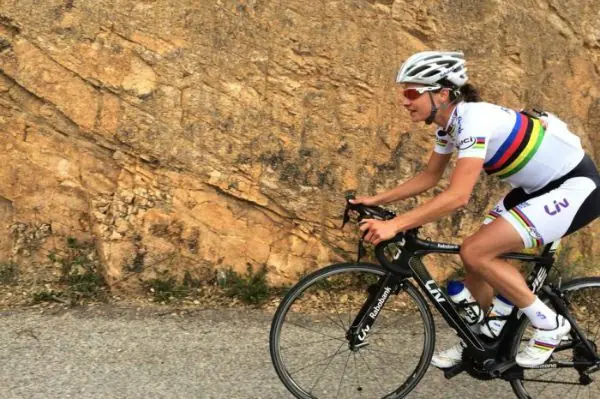There are very few podiums Dutch professional cyclist Marianne Vos hasn't stood atop, be it road racing, mountain biking, cyclo-cross or the track. This summer, the three-time world champion and two-time Olympic gold medalist—well, all-around badass seems most apropos—is in a new position for the first time in her prolific career: watching from behind the barriers, a fan as it were, sidelined by nagging injuries.
More: The Benefits of Cycling for Women
ACTIVE.com caught up with Vos between a trip to Italy to cheer on the Giro Rosa, and the second running of La Course, a one-day women's road race held on the final day of the Tour de France.
ACTIVE.com: Is it hard watching these races from the sidelines this year?
Marianne Vos: Yes, actually. I'm getting a bit better, so my training rides go better. When you're not feeling good enough, it's easier to say, 'OK let them race, I need to get fit first.' But now I am getting a bit better, and it's getting harder to watch. Of course, it's always nice to visit and catch up with other riders and with the team, but I'm missing it.
ACTIVE.com: Have you set a date for your return, or are you just taking it slowly?
MV: That's actually the last thing I am doing, because I targeted dates twice before this season; first after my hamstring injury, and then after my rib fracture (Vos suffered a hamstring injury at the 2015 Cyclocross World Championships in January, then broke a rib in a crash while previewing the course at the Haiming mountain bike race in Austria). Obviously that didn't really work out, and then I had to take a longer break to recover fully. I hope to still race this season, but I don't want to rush my buildup and training. If not this season, then I will be back for the next one. Ed. note: Vos' team, Rabobank-Liv, announced this week that she will not return to racing this year.
ACTIVE.com: You've said before that when your name is atop the leaderboard at so many races for so many years, you worry it hurts the perception of parity in women's cycling. Now that you've been on the other side for the past few months watching the women's field, what do you think of the competition level?
MV: Well, I've followed all the races, and it has been an interesting season with so many different winners. The field definitely has more depth than a few years ago, and this makes for better racing, as well. The teams are more balanced, so that's why you see different winners in the Giro stage races, in sprints, and I think it is a good evolution.
More: 5 Ways to Get Women More Involved in Cycling

ACTIVE.com: Do you think women's cycling right now is stronger than ever before?
MV: Yes, definitely. The top [performers have] always been good—the best athletes in every sport are the best for a reason. So it's not that it wasn't at a high level at the top, but the depth in the field is now way bigger and makes for better racing. It's more interesting to watch, more interesting for fans and more interesting for sponsors. I think we entered this phase maybe a few years ago, and it is on an upward [trajectory]. Of course, there is still progress to be made, and it is still sometimes a struggle, but I see a lot of positive notes at the moment. I'm looking into a bright future of women's cycling.
ACTIVE.com: You were one of the key drivers behind La Course becoming a reality. But by the same token, is it frustrating to see a classic stage race like the Giro Rosa get less attention than a one-off event such as this?
MV: Yes, of course, but this is what women's cycling has to go through. It's one of the steps we have to take. The calendar has to be more balanced. For example, the Giro Rosa is now in a nice month [July], but it is at the same time as the Tour [de France]. It doesn't matter in Italy because the attention is there, the media is there: In Italy, it is big. It is a fantastic race to race; for an insider, it's the biggest stage race there is, but outside of that, nobody knows it. It's something that needs to change, and UCI [Union Cycliste Internationale] is working on it.
ACTIVE.com: La Course actually couldn't have expanded to a stage race with the schedule as it is currently, right?
MV: No, and everybody is asking me if I'm angry about it. No, I am not angry. This [La Course] was an opportunity, a free weekend, and they gave us the chance to show women's cycling to the world on the Champs-Elysees, in one of the most iconic places for cycling, during the Tour, during one of the biggest sporting events in the world. And, of course, it would be fantastic to have a bigger stage race like the Tour de France or even in the Tour de France as in the past, but it would also be a shame if the Giro were to disappear. So there are some conflicts that you have to look into. Teams are also much smaller than men's teams, and they have to be prepared for an update in the calendar, as well. This kind of change is not a step that you take in one year, or only by one organization, because it will harm the sport. Maybe it will be good for a year, but you have to look for a longer future.


